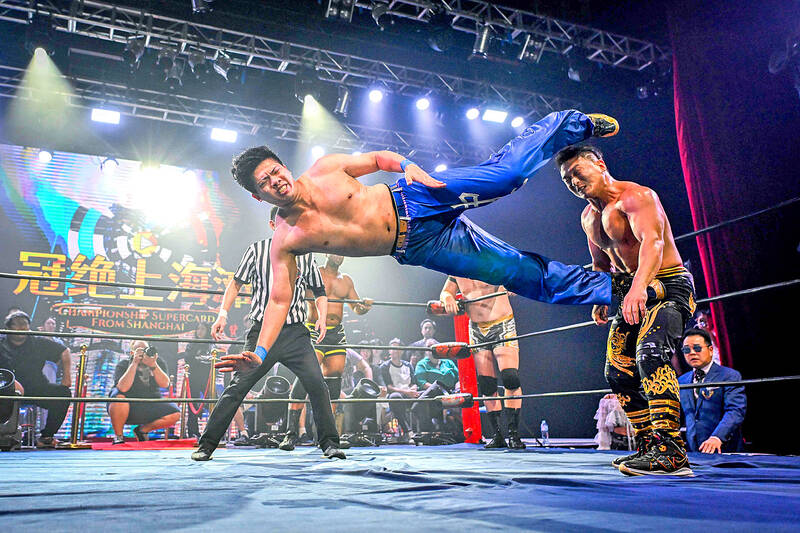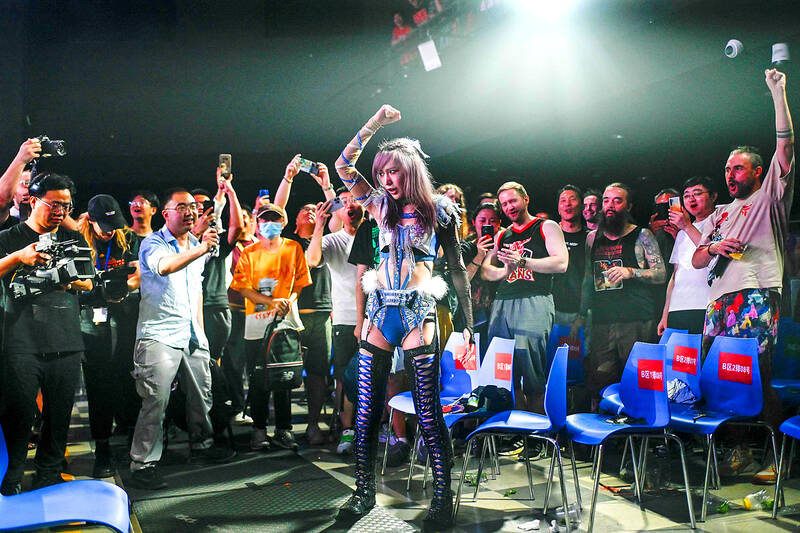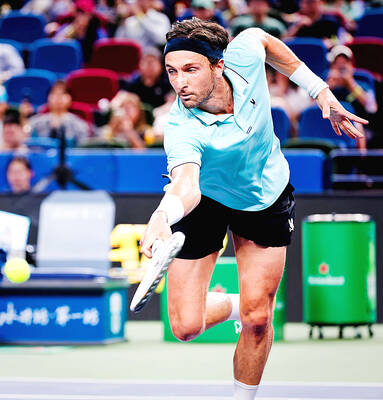When Wang Tao ran away from home aged 17 to become a professional wrestler, he knew it would be a hard slog to succeed in China’s passionate but underdeveloped scene. Years later, he has endured family disapproval, countless side gigs and thousands of hours of brutal training to become China’s “Belt and Road Champion” — but the struggle is far from over.
Despite a promising potential domestic market, the Chinese pro wrestling community has been battling for recognition and financial stability for decades.
“I have done all kinds of jobs [on the side]... Because in the end, it is very difficult to earn enough money to live on just through wrestling,” Wang said.

Photo: AFP
“I have never given up my dream, which is to make more and more people know China has wrestling,” he said.
Part sport and part entertainment, it is best known globally as a stereotypically US spectacle, embodied by the juggernaut World Wrestling Entertainment (WWE).
It is a marriage of intense athletic feat and melodramatic performance.

Photo: AFP
Hooked from a young age after watching Hollywood film The Wrestler, Wang quit high school and absconded north to train with other like-minded Chinese athletes.
“I tried to explain to my family ... But they all disagreed, and did not understand or support me,” Wang said.
These days they have come round — though he said they still hope he will find “a normal job.”
In the southern Chinese wilderness earlier this month, Wang and fellow wrestler Chen Wenbin slammed each other violently against the struts of a makeshift bamboo cage, smashing each other into a mud pit as curious villagers watched.
It is rudimentary, but far better than previous training conditions, Wang said.
He typically earns about 1,000 yuan (US$142) for fight nights and tries to boost that income with livestreaming.
In the nearby town, he and Chen have constructed a wrestling ring in an unfinished factory where they broadcast themselves practicing moves with names like Backbreaker and Facebuster.
Though the fighting is a pretence — moves are loosely choreographed and outcomes are predetermined — Wang has been knocked out for real before.
Wearing a “No pain, no gain” vest, Chen recalled when his wages came from performing in places such as bars — “it was just hard ground ... easy for us to get hurt.”
Self-described addiction continues to propel Wang and others.
“I love this industry so much that it doesn’t matter if I get hurt, I will stick with it,” Wang said.
The root of the addiction became clear last weekend.
At the Supercard From Shanghai — a fight night organized by Middle Kingdom Wrestling (MKW), a domestic promoter — Wang strode down a red carpet into the ring, transformed.
Hair slicked back and wearing a snug, black-scaled waistcoat, all trace of the mild-mannered, slightly shy Wang vanished as he leapt like a cat onto the top ropes and roared into the crowd.
To howls of delight, Wang defended his “Belt and Road” title in a frenetic four-way fight with another Chinese fighter, a Hungarian and an Emirati.
Accompanied by booming music and a rolling light show, the increasingly feral crowd of about 350 made up for in volume what they lacked in numbers.
“Definitely I would say we have more followers, more people are paying attention to us than ever,” MKW founder Adrian Gomez said.
The problem is that audience is still minuscule for China, with momentum lost during COVID-19 pandemic years.
The Supercard had 125,000 livestream viewers, a far cry from the millions targeted.
Nevertheless, many insist there is potential.
WWE China has about 36 million likes and 4 million followers on short video app Douyin, and analysts say it too has failed to maximize the country’s possibility.
“It’s a huge market in China, but we haven’t fully opened it yet,” said Chen, whose night ended less victoriously than Wang’s.
His shamanic alter ego ended up tossed onto a table, then a row of chairs, by China’s first-ever pro wrestler, The Slam.
The US’ Knickle Sloane said the show’s “grind of independent wrestling” had transported him back to his childhood.
“I feel there’s a market for [Chinese wrestling] and there’s a lot of people who want to see this happen,” he said.
For now, the dream is that “more people can make a living,” Gomez said.
“I think they deserve to be able to make a living out of what they’re good at,” Gomez said.

Jesper Boqvist on Tuesday scored the go-ahead goal midway through the third period as the Florida Panthers, after raising their second straight NHL Stanley Cup banner, opened the defense of the title by beating the Chicago Blackhawks 3-2. Mackie Samoskevich — getting his second assist, the fifth two-point game of his career — chipped the puck toward the goal and Boqvist knocked it out of the air for the lead with 10 minutes, 20 seconds left. A.J. Greer and Carter Verhaeghe also had goals for Florida, who got 17 saves from Sergei Bobrovsky. Frank Nazar had a goal and an assist and Teuvo

World No. 3 Alexander Zverev on Monday said that he was playing “terrible tennis” after he was knocked out of the Shanghai Masters by France’s Arthur Rinderknech 4-6, 6-3, 6-2. His exit leaves Novak Djokovic as the tournament’s top-ranked player, increasing the 38-year-old Serb’s chances of winning a record-extending fifth title in the Chinese financial hub. In stifling conditions, world No. 54 Rinderknech came back from a set down to stun an increasingly rattled Zverev into submission. It is the second time the Frenchman has beaten him, after bundling him out of Wimbledon earlier this year. A despondent Zverev told reporters the match had

‘SOMETHING SPECIAL’: Nathan Lukes hit a two-run single and Addison Barger had three of Toronto’s 12 hits as the Blue Jays bounced back After taking down the storied New York Yankees in their own ballpark in their American League Division Series on Wednesday, Toronto Blue Jays manager John Schneider was ready to revel in the triumph. “Start spreading the news,” Schneider said while popping a bottle of bubbly to set off the Blue Jays’ jubilant celebration inside their Yankee Stadium clubhouse. With the party under way, the familiar lyrics from Frank Sinatra’s version of New York, New York — the Yankees’ long-time victory anthem — sounded in the background as roaring Toronto players sprayed each other with booze in the Bronx. This time, it was their

‘IT’S BASEBALL’: In just the second error to end a post-season series in the MLB, the Phillies reliever fumbled a comebacker and threw to home, despite the signal Eyes red, Orion Kerkering on Thursday received words of support from his Philadelphia Phillies teammates. “Just keep your head up. It’s an honest mistake. Just, it’s baseball,” he remembered hearing. “You’ll be good for a long time to come,” they added. “It’s not my fault, then. We had opportunities to score,” was the message he kept getting. Kerkering made a wild throw past home plate instead of tossing to first after mishandling Andy Pages’ bases-loaded comebacker with two outs in the 11th inning. Pinch-runner Kim Hye-seong scored and the Phillies were eliminated with a 2-1 loss that gave the Los Angeles Dodgers a